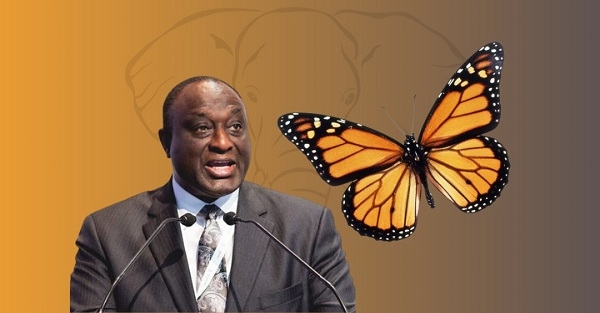A few days ago, while diving deep into Ghana’s political history, I found myself revisiting the story of the Northern Students Union and, more significantly, the Northern People’s Party (NPP). That journey naturally led me to the towering figure of Simon Diedong Dombo, under whose leadership the NPP became the main opposition force of the time.
My curiosity didn’t end there. I traced the historical transition from the NPP into the broader United Party (UP) and followed the thread all the way to the present. It became clear to me how these early opposition movements laid the foundation for what we, today, know as the New Patriotic Party (NPP).
The original United Party, formed during the political turbulence of the late 1950s, had at its helm Dr. Kofi Abrefa Busia. The UP symbolized unity, liberal democratic values, and national character—especially after ethnic-based parties were outlawed. It brought together forces from the Northern People’s Party, National Liberation Movement (NLM), Anlo Youth Organisation, Ga Shifimokpee, and others.
Fast forward to 2025: a political phoenix has risen from the ashes. The Movement for Change, led by Alan Kwadwo Kyerematen, has metamorphosed into a fully-fledged political partythe United Party (UP). This move, I consider as not just symbolic, but strategic.
It evokes the historical memory and emotional attachment of a political tradition many Ghanaians still hold dear.
You may recall that the Movement for Change was formed in September following serious internal issues with the NPP. Alan Kyerematen resigned from the NPP after alleging that he has been treated unfairly by the party.
The former Minister of Trade formed the Movement to enable him and his followers as well as the Ghanaian youth participate in the country’s democratic space. He led the movement to introduced its development agenda called the 10-point Agenda. Subsequently, in the presidential elections, Alan pulled 32, 457 votes representing 0.28% of the total votes.
Many thought, that, with this seeming abysmal performance, the Movement for Change would have aborted its political escapades. However, the Movement from Change is far from giving up hence this development.
WHY THE NAME MATTERS
The choice of the name “United Party” is no accident. It carries ideological and emotional currency.
For those who understand Ghana’s political ancestry, this new UP taps into the legacies of the Progress Party, Northern People’s Party, and the NLM. It is not just a name it is a reclamation of history, a nod to political roots, and an attempt to reawaken a dormant tradition.
The original UP was a political melting pot—a coming together of various smaller opposition groupings under one banner to challenge the dominance of the CPP government. Its liberal democratic orientation stemmed from the fact that it had to accommodate diverse views and regional interests. The same ethos seems to guide the current UP under Alan.
THE UP-Plus AGENDA
Branded as UP Plus, the new party seeks to provide a third force in Ghana’s entrenched two-party system. Alan Kyerematen, a former Trade and Industry Minister, has positioned the party as a credible alternative anchored on three key pillars:
KEY OBJECTIVES
•Economic Transformation: Position Ghana as the economic hub of Africa by 2040.
•Inclusive Governance: Uphold transparency, accountability, and zero tolerance for corruption.
•National Unity: Heal political divisions and foster a collective sense of national purpose.
SYMBOLISM
The party’s emblem a Monarch Butterfly symbolizes transformation, resilience, and endurance. Its colours (yellow, black, and white) represent Ghana’s gold wealth, the Black Star of Africa, and purity of intent, respectively.
A STRATEGIC GAMBLE OR POLITICAL MASTERSTROKE?
One question that remains unanswered is whether the current UP intends to forge alliances with other smaller parties to create a broader coalition perhaps even a reimagined opposition front. If history is anything to go by, this would not be a far-fetched strategy.
After all, the original UP was itself a coalition of forces, necessitated by the political climate of the time.
What is, however, palpably clear is that the new UP is deeply rooted in Ghana’s political tradition. It is not alien. For those who believe in the ideals of the NPP of Dombo, the Progress Party of Busia, or the NLM of Baffour Osei Akoto, the current UP offers a familiar ideological home.
There’s no denying that in Ghana, many people choose their political affiliation based on ideology, tradition, or identity not just manifestos. And herein lies the potential threat to the current New Patriotic Party (NPP).
If the NPP does not handle its internal cracks and factionalism carefully, it risks losing key members and floating sympathizers to a party like the UP, which shares a common ancestry.
ALAN’S CALCULATED MOVE
Say what you will about Alan Kyerematen and his team, but they are playing the long game. Their approach calculated, calm, and anchored in strategic branding may not yield immediate electoral gains, but it has the potential to disrupt the status quo.
In fact, with their communication style, their historical appeal, and Alan’s personal gravitas, the UP is well-positioned to rival the NPP in areas where ideological loyalty matters.
Let’s face facts the NPP, despite being the largest opposition party today, often relies heavily on two key regions to clinch victory. Any noticeable drop in turnout, disaffection, or apathy in these strongholds can tilt the balance as we saw in the last general elections.
While some may downplay Alan’s departure from the NPP and his presidential ambition, the numbers don’t lie.
He’s not standing alone. There’s a solid support base behind him—numbers that any serious political party would need to secure a win in Ghana’s fiercely competitive electoral space.
CONCLUSION:
The emergence of the new United Party may appear to some as a political rebrand, but for those with an understanding of Ghana’s political history, it is a revival of a deeply rooted tradition.
In a political environment ripe for disruption, this could be more than just a passing phase it could be the beginning of a new political paradigm.
Denis Andaban
The Village Boy From DBI
